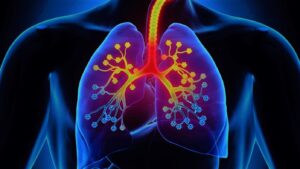Asthma
About –
it is a chronic respiratory condition that causes inflammation and narrowing of the airways, making it difficult to breathe. It affects people of all ages, but often starts in childhood. Asthma is a common condition, affecting an estimated 339 million people worldwide.
Symptoms of it may include:
- Wheezing, a whistling sound when breathing
- Shortness of breath
- Chest tightness or pain
- Coughing, particularly at night or early in the morning
- Difficulty breathing during or after exercise
it symptoms can be triggered by a variety of factors, including allergens (such as pollen, dust mites, or animal dander), irritants (such as cigarette smoke, air pollution, or strong odors), respiratory infections, exercise, and emotional stress.
it is typically diagnosed through a combination of medical history, physical exam, and lung function tests, such as spirometry or peak flow testing. Treatment for asthma may involve the use of inhaled medications, such as bronchodilators and corticosteroids, to reduce inflammation and open up the airways. Other treatments may include allergy medications, immunotherapy (allergy shots), and avoiding triggers.
With proper management, most people with asthma are able to lead normal, active lives without significant limitations. It is important to work with a healthcare provider to develop an individualized treatment plan and monitor symptoms to prevent exacerbations and reduce the risk of complications.
Symptoms –
The symptoms of it may vary from person to person and can range from mild to severe. The most common symptoms of asthma include:
- Wheezing: A whistling or hissing sound when breathing out.
- Shortness of breath: A feeling of not being able to catch your breath or take a deep breath.
- Chest tightness: A sensation of tightness or pressure in the chest.
- Coughing: A persistent cough, especially at night or early in the morning.
it symptoms may be triggered by a variety of factors, including allergens (such as pollen, dust mites, or animal dander), irritants (such as cigarette smoke, air pollution, or strong odors), respiratory infections, exercise, and emotional stress.
It is important to note that not all people with asthma experience all of these symptoms, and some people may experience symptoms only during certain times (e.g. during exercise). It is also possible to have it without experiencing any symptoms (known as “silent” or “asymptomatic” asthma).
If you are experiencing any of these symptoms, especially if they interfere with daily activities or are accompanied by difficulty breathing or chest pain, it is important to seek medical attention. Asthma can be a serious condition, and early diagnosis and treatment can help manage symptoms and prevent complications.
Causes –
The exact causes of asthma are not fully understood, but it is believed to be a complex interplay between genetic and environmental factors. The following are some of the factors that are believed to contribute to the development of it:
- Genetics: it tends to run in families, and research has identified specific genes that may increase the risk of developing the condition.
- Environmental factors: Exposure to certain environmental factors, such as air pollution, tobacco smoke, and occupational dust or chemicals, may increase the risk of developing asthma.
- Allergens: Exposure to allergens such as pollen, dust mites, animal dander, and mold can trigger asthma symptoms in some people.
- Respiratory infections: Respiratory infections such as colds, flu, and pneumonia can trigger it symptoms in some people.
- Exercise: Vigorous exercise can cause shortness of breath and other asthma symptoms in some people, a condition known as exercise-induced asthma.
- Emotional factors: Stress and other emotional factors can trigger it symptoms in some people.
It is important to note that not everyone with it is triggered by the same factors, and some people may be more sensitive to certain triggers than others. Identifying and avoiding triggers is an important part of managing it symptoms. Working with a healthcare provider to develop an individualized treatment plan can help manage symptoms and prevent complications.
Types –
There are several types of asthma, including:
- Allergic asthma: This is the most common type of asthma and is triggered by exposure to allergens such as pollen, dust mites, and animal dander.
- Non-allergic asthma: This type of it is not triggered by allergens, but instead by other factors such as stress, exercise, cold air, or irritants such as smoke or pollution.
- Occupational asthma: This type of it is triggered by exposure to workplace irritants such as chemicals, dust, or fumes.
- Exercise-induced asthma: This type of it is triggered by physical activity and typically occurs during or immediately after exercise.
- Cough-variant asthma: This type of it is characterized by a persistent cough, but without other typical asthma symptoms such as wheezing or shortness of breath.
- Nocturnal asthma: This type of it tends to worsen at night, often causing symptoms such as coughing, wheezing, and shortness of breath that can disrupt sleep.
It is important to note that some people with it may have a combination of these types, or their it may change over time. Proper diagnosis and treatment are important to manage symptoms and prevent complications.
Treatment –
The treatment of it depends on the severity of the condition and the individual’s specific symptoms and triggers. There are several types of medications that can be used to treat asthma:
- Inhaled bronchodilators: These medications relax the muscles around the airways, making it easier to breathe. They are typically used as a quick-relief medication during an asthma attack.
- Inhaled corticosteroids: These medications reduce inflammation in the airways, preventing asthma symptoms from developing. They are typically used as a long-term medication to manage asthma symptoms and prevent attacks.
- Combination inhalers: These inhalers contain both a bronchodilator and a corticosteroid and are used to provide both quick relief and long-term management of asthma symptoms.
- Leukotriene modifiers: These medications block the action of leukotrienes, which are chemicals that can cause inflammation in the airways.
- Immunomodulators: These medications modify the body’s immune response and can be used to treat severe asthma that is not well controlled with other medications.
In addition to medication, lifestyle modifications can also help manage it symptoms. These include:
- Avoiding triggers: Identifying and avoiding triggers such as allergens, irritants, and certain foods can help prevent asthma symptoms.
- Keeping a clean home: Reducing exposure to dust mites and other allergens in the home can help prevent asthma symptoms.
- Getting regular exercise: Staying active can help improve lung function and reduce it symptoms.
- Managing stress: Stress can trigger it symptoms, so finding ways to manage stress such as through meditation, yoga, or therapy can be helpful.
It is important for people with it to work closely with a healthcare provider to develop an individualized treatment plan that addresses their specific symptoms and triggers. Regular check-ups are also important to monitor it symptoms and adjust treatment as needed.
Diagnosis –
The diagnosis of it typically involves a combination of medical history, physical examination, and lung function tests. The following are some common diagnostic tests and procedures for it :
- Medical history: The healthcare provider will ask about the individual’s symptoms, family history of it , and any other factors that may be contributing to their condition.
- Physical examination: The healthcare provider will listen to the individual’s lungs and look for signs of inflammation or other abnormalities.
- Lung function tests: These tests measure how much air the individual can exhale and how quickly they can do so. Common lung function tests for it include spirometry, peak flow measurement, and methacholine challenge test.
- Allergy testing: Allergy testing may be recommended to identify allergens that may be triggering it symptoms.
- Chest X-ray or CT scan: These imaging tests may be ordered to rule out other conditions that may be causing respiratory symptoms.
It is important to note that it can be difficult to diagnose, as symptoms can vary widely between individuals and can be similar to other respiratory conditions. Working closely with a healthcare provider and undergoing thorough diagnostic testing is important to ensure an accurate diagnosis and appropriate treatment plan.



